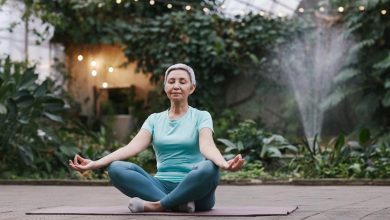7 Tips to Help Manage Anxiety Calmer

In a world that often feels chaotic and overwhelming, finding inner calm can seem like an elusive goal. However, with the right tools and strategies, managing anxiety can become an attainable reality. In this article, we will explore seven practical tips to help you navigate the challenges of anxiety and find a sense of peace. From understanding triggers to embracing holistic approaches and seeking support, these techniques will empower you on your journey to a calmer, more balanced life.
Key Takeaways
- Anxiety can manifest in various ways and can include symptoms such as worry, restlessness, tension, increased heart rate, and rapid breathing.
- Managing anxiety can involve a combination of medication, holistic approaches like diet, exercise, sleep, psychological support, mindfulness resources, and workplace education.
- Breathing techniques, such as 4-7-8 breathing, and seeking support from someone you trust can help with managing anxiety.
- Maintaining a positive mindset, engaging in a healthy lifestyle including regular physical activity, a nutritious diet, and prioritizing a consistent sleep routine are important for managing anxiety.
Understanding Anxiety and Its Triggers
Understanding anxiety and its triggers involves identifying the factors that contribute to the onset and intensification of anxious thoughts and feelings. One effective approach in managing anxiety is cognitive therapy, which focuses on recognizing and challenging negative thought patterns that contribute to anxiety. By identifying triggers, individuals can gain insight into specific situations, thoughts, or experiences that provoke anxiety. These triggers can vary from person to person, but may include stressful events, certain environments, or even specific thoughts or memories. Cognitive therapy helps individuals develop coping strategies and replace negative thoughts with more positive and realistic ones. It provides a framework for understanding the connection between thoughts, emotions, and behaviors, ultimately helping individuals regain control over their anxiety. By identifying triggers and utilizing cognitive therapy techniques, individuals can effectively manage their anxiety and improve their overall well-being.
Utilizing Holistic Approaches for Anxiety Management
To effectively manage anxiety, individuals can utilize holistic approaches that incorporate various strategies and techniques. Holistic practices take into account the mind, body, and spirit, aiming to create balance and harmony. Incorporating mindfulness exercises can be particularly beneficial in reducing anxiety symptoms. Here are four holistic approaches that can be helpful in managing anxiety:
- Engage in regular physical activity, such as yoga or dancing, to release tension and promote relaxation.
- Practice deep breathing techniques, like the 4-7-8 breathing method, to calm the nervous system and promote a sense of tranquility.
- Prioritize self-care activities that nurture your mental and emotional well-being, such as meditation or journaling.
- Explore alternative therapies, such as acupuncture or aromatherapy, that can aid in relaxation and stress reduction.
Breathing Techniques and Seeking Support
When managing anxiety, it is important to incorporate breathing techniques and seek support from trusted individuals or professionals. One effective breathing technique that can help reduce anxiety is the 4-7-8 breathing technique. This technique involves inhaling deeply through the nose for a count of 4, holding the breath for a count of 7, and exhaling slowly through the mouth for a count of 8. This breathing pattern has been shown to activate the body's relaxation response and promote a sense of calm. Additionally, talking to someone you trust can provide significant benefits in managing anxiety. Sharing your thoughts and feelings with a supportive listener can help alleviate stress, provide perspective, and offer emotional support. Whether it's a friend, family member, or therapist, seeking support from others can make a positive difference in your journey to manage anxiety.
Maintaining a Positive Mindset and Healthy Lifestyle
Maintaining a positive mindset and a healthy lifestyle are crucial factors in effectively managing anxiety. When it comes to managing anxiety, finding reasons to laugh and enjoy humor can have tremendous benefits. Laughter releases endorphins, which are natural mood boosters that can help alleviate stress and anxiety. Additionally, maintaining a positive attitude and focusing on joy can shift our mindset and reduce anxiety levels.
Another important aspect of managing anxiety is prioritizing a consistent sleep routine. Sleep plays a vital role in our overall mental and physical well-being. Establishing a regular sleep schedule can help regulate our mood and improve cognitive functions, reducing anxiety symptoms. It is essential to ensure that we create a conducive sleep environment, practice good sleep hygiene, and avoid stimulants before bedtime.
Coping With Stress and Managing Anxiety
Effective coping strategies are essential for individuals to successfully manage the stress and anxiety they experience in their daily lives. Stress reduction and anxiety relief are crucial for maintaining good mental health and overall well-being. There are various techniques and approaches that can be helpful in coping with stress and managing anxiety. One effective strategy is to engage in regular physical activity, such as sports, yoga, or dancing, as exercise has been shown to reduce stress and promote relaxation. Another helpful technique is practicing mindfulness and deep breathing exercises, such as the 4-7-8 breathing technique, which can help calm the mind and body. Seeking support from trusted individuals and talking about your feelings can also provide relief and a sense of connection. Additionally, maintaining a positive mindset, finding reasons to laugh and enjoy humor, and prioritizing a consistent sleep routine can contribute to stress reduction and anxiety relief. It is important to remember that everyone is different, so it may be necessary to experiment and find what coping strategies work best for you. If symptoms persist, it is advisable to consult a medical doctor or mental health professional for professional guidance.
Importance of Stress Management and Relaxation
In order to effectively manage anxiety and promote overall well-being, it is essential to prioritize stress management and relaxation on a regular basis. Here are some important reasons why stress management and relaxation should be a priority:
- Reduces the risk of anxiety disorders: Chronic stress can lead to the development of anxiety disorders. By managing stress effectively, you can decrease the likelihood of experiencing debilitating anxiety.
- Enhances brain function: Relaxation techniques, coupled with brain-boosting foods, can improve cognitive abilities such as memory, focus, and concentration.
- Improves physical health: Chronic stress can have detrimental effects on the body, including increased blood pressure and weakened immune system. Engaging in relaxation techniques can help alleviate these physical symptoms.
- Boosts mental well-being: Relaxation promotes a sense of calm and tranquility, reducing feelings of anxiety and promoting a positive mindset.
Tips and Resources From Calmer for Anxiety Management
Seeking professional guidance and utilizing effective resources are essential for managing anxiety effectively. When it comes to anxiety management, Calmer offers valuable tips and resources to help individuals cope with their symptoms. One of the key resources provided by Calmer is a range of calming techniques that can be practiced daily. These techniques include deep breathing exercises, progressive muscle relaxation, and guided imagery. Calmer also emphasizes the importance of seeking professional guidance from trained therapists or counselors who can provide personalized support and strategies for managing anxiety. Additionally, Calmer offers workshops, online courses, and educational materials that aim to educate individuals about anxiety and equip them with the necessary tools to manage it effectively. By incorporating these resources and techniques into their daily lives, individuals can find relief from anxiety and improve their overall well-being.
Frequently Asked Questions
Can Anxiety Be Completely Cured With Medication?
Anxiety cannot be completely cured with medication alone. While medication can be effective in reducing anxiety symptoms for some individuals, it may not work for everyone. It is important to explore alternative options, such as natural remedies and holistic approaches, in conjunction with medication. These may include lifestyle changes, therapy, mindfulness practices, and stress management techniques. Consulting with a healthcare professional can help determine the best course of treatment for managing anxiety.
What Are Some Common Triggers for Anxiety?
Common triggers for anxiety can vary from person to person, but some common ones include work-related stress, financial difficulties, relationship problems, major life changes, and traumatic events. Coping mechanisms for anxiety can include practicing relaxation techniques, such as deep breathing and mindfulness, seeking support from loved ones or mental health professionals, engaging in physical activity, maintaining a healthy lifestyle, and implementing stress management strategies. It is important to remember that everyone's experience with anxiety is unique, and finding personalized coping mechanisms is essential.
Can Anxiety Be Managed Without Medication?
Yes, anxiety can be managed without medication. Alternative treatments and mindfulness techniques can be effective in reducing anxiety symptoms. These approaches focus on addressing the root causes of anxiety and promoting overall well-being. By incorporating practices such as meditation, deep breathing exercises, and cognitive-behavioral therapy, individuals can develop coping mechanisms and gain a sense of control over their anxiety. It is important to consult with a healthcare professional to determine the most suitable approach for managing anxiety without medication.
How Long Does It Take for Breathing Techniques to Alleviate Anxiety Symptoms?
Breathing techniques can be effective in alleviating anxiety symptoms, although the time it takes for them to take effect can vary from person to person. While some individuals may experience immediate relief, others may require more practice and consistency to notice significant improvement. It is important to remember that breathing exercises are just one of many alternative methods for managing anxiety. Other strategies, such as seeking support from trusted individuals, maintaining a positive mindset, and adopting a healthy lifestyle, can also contribute to anxiety relief.
Are There Any Specific Foods That Can Worsen Anxiety Symptoms?
Foods to avoid for anxiety management are those that can exacerbate symptoms, such as caffeine, alcohol, processed foods, and high-sugar snacks. Incorporating anxiety-friendly foods into your diet can help manage symptoms. These include foods rich in omega-3 fatty acids, such as fatty fish, nuts, and seeds, as well as magnesium-rich foods like leafy greens, legumes, and whole grains. A balanced diet, along with other stress management techniques, can support overall mental wellbeing.


